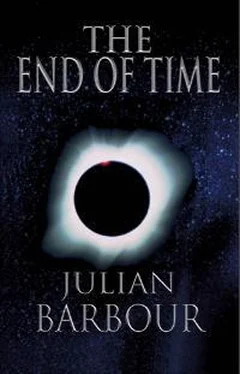I can only say that is not how I see things. I search in vain for Omega in Platonia and find only Alpha. But Platonia is a vast land. Let us cherish everything around us wherever we happen to find ourselves in the Platonic palace.
Of one thing I feel very sure. Many poets and theologians give a misleading image of heaven and eternity. Consider the opening lines of Vaughan’s famous poem The World’:
I saw Eternity the other night
Like a great Ring of pure and endless light,
All calm as it was bright;
And round beneath it, Time, in hours, days, years,
Driven by the spheres,
Like a vast shadow moved, in which the world
And all her train were hurled.
This is magnificent poetry as a description of the mystical state in which mind comprehends all structure as unified. But the real wonder of unity is when it knits together rich variety. Bliss is comprehension of many things in harmony at once. I do not think that eternity is pure and endless light. Such light merely illuminates, for example, the millions of leaves of the forest of the American fall when we see them all at once.
Is Time Travel Possible ?
Time travel of a sort is possible within general relativity as a classical theory, but is subject to strict limitations. You cannot travel back into the past and kill your parents before your conception. In quantum cosmology, you can travel back to a parallel universe, and there kill your parents before they conceive you. However, we have to be careful about the use of ‘you’. The person who ‘travels’ to these other worlds is not exactly you now. As the discussion of the haemoglobin molecule showed, the change within our bodies from one instant to another is stupendous. The fact that we have such an enduring sense of deep continuity of our personal identity is very remarkable. I see it as another manifestation of the creative power that brings everything into existence. Stephen Hawking long suspected that even if time travel is logically possible, it will have a very low probability in quantum cosmology. That is my feeling too. Platonia certainly contains Nows in which there are beings whose memories tell them they have travelled backwards in time. However, I think such Nows have a very low probability.
To tell the truth, I find the idea of time travel boring compared with the reality of our normal existence. Each time capsule that represents an experienced Now reflects innumerable other Nows all over Platonia, some of them vividly. In a very real sense, our memories make us present in what we call the past, and our anticipations give us a foretaste of what we call the future. Why do we need time machines if our very existence is a kind of being present everywhere in what can be? This is very Leibnizian. We are all part of one another, and we are each just the totality of things seen from our own viewpoint.
Doesn’t the Denial of Motion Take All Joy and Verve out of Life ?
I do feel this issue keenly. The kingfisher parable should make that clear. In principle, there is no reason why we should not attempt to put our very direct sense of change directly into the foundations of physics. There is a long tradition, going back at least to Hamilton, that seeks to make process the most basic thing in the world. Roughly, the idea is that physics should be built up using verbs, not nouns. In 1929 the English philosopher Alfred North Whitehead published an unreadable – in my experience – book called Process and Reality in which he advocated process. It all sounds very exciting, but I just do not think it can be done, despite a valiant attempt by Abner Shimony. Having translated seventy million words of Russian into English, I can say with some feeling that sentences do have a subject and generally an object. I could have written this book using the one verb ‘to be’, which hardly counts as a verb. For this reason it seldom appears in Russian; when it does, it is most often as a surrogate: ‘to appear’. But a book without nouns is nothing. Not even James Joyce could write it. For some reason, disembodied verbs exert a fascination not unlike the grin of the Cheshire cat. But when Owen Glendower claimed to be able to ‘call up spirits from the vasty deep’, Hotspur answered: ‘Aye, and so can I and any man, but will they come when you call them?’ I should like to see it done.
Less provocatively, I wonder if, at root, there is that much difference between the Heraclitan and Parmenidean schools, representing ‘verbs’ and ‘nouns’ respectively. If my definition of an instant of time is accepted, it becomes hard to say in what respect those two great Pre-Socratics might differ. The two best-known sayings attributed to Heraclitus are ‘Everything flows’ ( Panta rei ) and the very sentence which, entirely unconsciously, I used to clinch the argument that the cat Lucy who leapt to catch the swift was not the cat who landed with her prey: ‘One cannot step into the same river twice.’ There is always change from one instant to another – no two are alike. But that is just what I have tried to capture with the notion of Platonia as the collection of all distinct instants. Heraclitus argued that the appearance of permanence, of enduring substance, is an illusion created by the laws that govern change. Obviously, he and Parmenides could not be expected to have anticipated quantum mechanics, wave functions and the Wheeler-DeWitt equation, But I see Bell’s account of alpha-particle track formation as remarkable support for the Heraclitan standpoint that appearances are the outcome of the laws that bring them forth. Would it not be a wonderful reconciliation of opposites if the static wave function were to settle spontaneously on time capsules that are redolent of both flux (evidence of history) and stasis (evidence that things endured through it)?
But the loss of motion is still poignant, a premonition of mortality and a view of our life from outside it. There is a scene in George Eliot’s Middlemarch in which Ladislaw and a painter friend chance to see the heroine Dorothea in a particularly striking pose in Rome. The painter is keen to capture it on canvas, but Ladislaw taunts him:
Painting stares at you with an insistent imperfection. I feel that especially about representations of women. As if a woman were a mere coloured superficies! You must wait for movement and tone. There is a difference in their very breathing: they change from moment to moment.
Keats too, for all the beauty of his Grecian urn, addresses it with the words
Thou, silent form! Dost tease us out of thought
As doth eternity. Cold Pastoral!
When Keats wrote these lines, he must have known that all too soon his home would be a grave. Is Platonia a graveyard? Of a kind it undoubtedly is, but it is a heavenly vault. For it is more like a miraculous store of paintings by artists representing the entire range of abilities. The best pictures are those that somehow reflect one another. These are the paintings we find there in profusion. There are very few of the mediocre, dull ones. Despite what Ladislaw says, the best paintings have a tremendous vibrancy. Turner does almost bind you to the mast of the Ariel . Indeed, Ladislaw’s own words immediately before the passage quoted above are: ‘After all, the true seeing is within.’ Frozen it may be, but Platonia is the demesne where ‘Beauty is truth, truth beauty’ and the boughs cannot shed their leaves ‘nor ever bid the Spring adieu’. With that perfect ode, Keats did achieve the immortality for which he so desperately longed.
In a fine essay entitled ‘The timeless world of a play’, Tennessee Williams praises great sculpture because it
often follows the lines of the human body, yet the repose of great sculpture suddenly transmutes those human lines to something that has an absoluteness, a purity, a beauty, which would not be possible in a living mobile form.
Читать дальше












